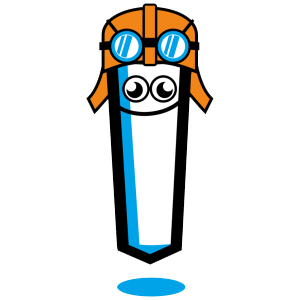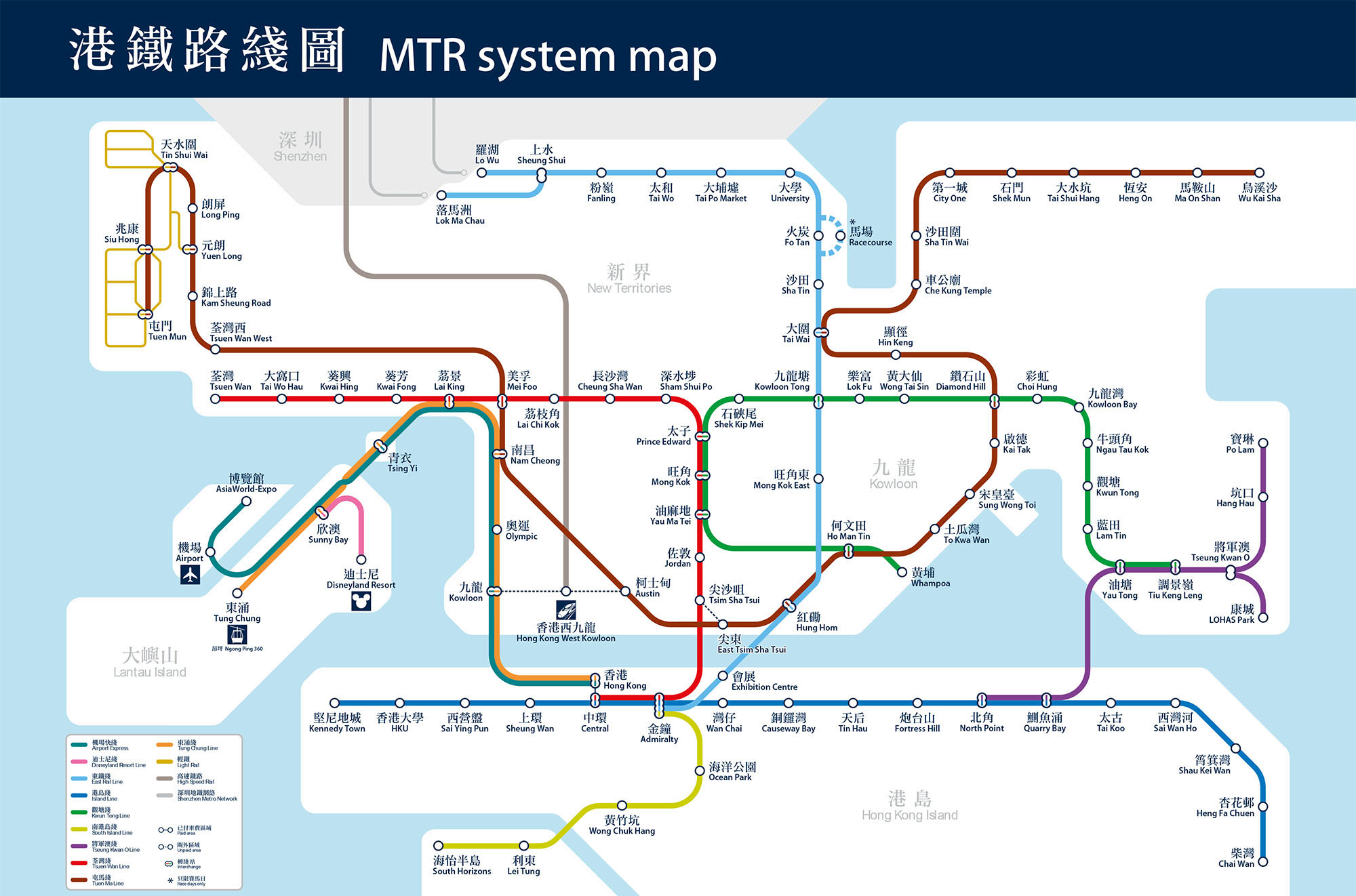Transportation
1. Mass Transit Railway (MTR)
The MTR allows you to get to all major districts in Hong Kong as well as its bordering areas with Mainland China (Lo Wu station and Lok Ma Chau station). There are many free mobile applications that you can download to help navigate Hong Kong’s MTR and bus systems such as the “MTR Mobile” app.
Airport Express Travel Pass
Purchasing the $220 or $300 Airport Express Travel Pass (both include a refundable deposit of $50) will allow you to enjoy one or two single journeys on the Airport Express, as well as three consecutive days of unlimited travel on the MTR, the Light Rail and MTR Bus (which operates in the northwest New Territories)*. The ticket is valid for 180 days from the day of issue.
*Does not include additional travel on the Airport Express, East Rail Line First Class, and travel to or from Lo Wu or Lok Ma Chau stations.
Tourist Day Pass
Purchase a $55 Tourist Day Pass to enjoy any one day* of unlimited travel on the MTR** to experience Hong Kong. The ticket is valid for one month from the date of issue. The Airport Express Travel Pass and Tourist Day Pass are only available to visitors who are not Hong Kong residents and who have been in Hong Kong for less than 14 days.
* One day of unlimited travel means 24 consecutive hours beginning from the recorded entry time of the first journey.
** Excludes the Airport Express, the MTR bus, East Rail Line First Class, Lo Wu Station and Lok Ma Chau Station.
2. Buses
Buses in Hong Kong are plentiful and comfortable, with most of it being air-conditioned. Fares are based on distance travelled and exact change is required if paying by cash. Octopus cards are accepted on all buses in Hong Kong.
3. Minibuses
Minibuses are small buses that can ferry about 16 people. Green minibuses operate along specific routes at fixed prices while red minibuses offer non-scheduled services without any fixed routes. Passengers can get on and off anywhere along the route except where special prohibitions apply. You pay as you alight when travelling on a red minibus and the driver can usually provide change for small notes. Once minibuses are full, it would not stop for a new passenger until someone else gets off and a seat becomes available. The ability to speak a bit of Cantonese and having some familiarity with Hong Kong will be a bonus when travelling on minibuses.
4. Taxis
Taxis are plentiful throughout Hong Kong with the exception of some very remote areas. All are metered, air-conditioned and clean.
Taxis in Hong Kong are categorised by 3 distinct colours, each indicating a certain geographical area that it operates in. All taxis though, can travel to and from Hong Kong International Airport and Hong Kong Disneyland.
- Red taxis operate throughout most of Hong Kong, except for Tung Chung Road on Lantau Island and the entire southern side of Lantau Island
- Green taxis only service the New Territories
- Blue taxis only operate on Lantau Island
There are also cabs that cater for other purposes.
- Diamond Cab accommodates a maximum of two wheelchair users on a single trip with two carers, or five passengers without wheelchairs
- SynCab accommodates a maximum of one wheelchair user on a single trip with two carers, or four passengers without wheelchairs.
Flying Chalks’ tip: The Taxi Fare calculator may aid in helping you gauge how much you would spend
5. Trams
Boarding one of Hong Kong’s historic trams is like taking a step back in time as these double-decker streetcars have been around since 1904 and continues to be an affordable and fun way to get around the city. Each tram ride costs a flat fare of $2.30 regardless of how far you travel. All trams accept the Octopus cards and exact change is required if you intend to pay by cash.
Flying Chalks’ recommendation: Grab a seat by the window on the upper deck for the best views!
6. Ferries
For more information, you can visit Hong Kong’s Transport Department website here!
You can also visit Discover Hong Kong’s website here!
Banking Services:
To set up a bank account, you will require:
- Valid passport (ID)
- Proof of residency
Flying Chalks’ tip: HSBC and The Bank of East Asia each have a branch on HKU’s main campus! They are located at the Run Run Shaw Building and Central Podium Levels respectively. In addition, students at the main campus also have access to The Bank of China’s ATMs while those at the Sassoon Road campus to that of Hang Seng Bank’s ATMs. Should you encounter any language difficulties or require a wider range of services, you may want to consider heading to the larger bank branches in Central where there will be more English-speaking staff and managers who are more adept in catering to the needs of foreigners.
Major Banks in Hong Kong:
- HSBC (Hong Kong Shanghai Banking Corporation) & Hang Seng Bank
HSBC is the largest (by value of assets) and most visible bank in Hong Kong with its branches and own Automated Teller Machines (ATMs) all over the city. Opening an account with HSBC also allows you access to all of Hang Seng’s ATMs as the latter is its subsidiary. - DBS Bank Ltd
DBS Bank also has quite a significant presence in Hong Kong and may be more convenient for Asian students that already have accounts with it. - Bank of China (Hong Kong)
- Standard Chartered Bank
- Bank of East Asia
Post office Services:
There is a select few postage services available on the Ground Floor of John Fulton Centre on campus.
Student feedback 1: “Post office easily accessible on-campus and in Jordan/Yau Ma Tei. It costs about HKD$700 to ship about 18kg of my belongings back to Singapore from Hong Kong.”
Student feedback 2: “It cost about S$50 for 10kg, and it arrived at my home in 3 days.”
Student feedback 3: “Post office services are efficient and quick. I do not have to spend a long time queuing at the post office and the staff there is rather helpful as well.”
Medical services:
Hong Kong has world-class hospitals that provide accident and emergency services should there be an unfortunate need for it. Visitors requiring these services will be charged a fixed fee of $900 per admission. However, rest assure that you will always be treated even if you are unable to pay the fee immediately.
Should you merely require diagnosis and medicine for mild illnesses, you will be glad to know that CUHK has a clinic on campus for its students! The University Health Service (UHS) provides free primary care facilities and clinical services to all local and exchange students where basic medication is free of charge.
| Contact | Address | Opening Hours |
|---|---|---|---|
(852) 3943 6422 | |||
(852) 3943 6412 | |||
School of Chinese Medicine Teaching Clinic | (852) 3943 4024 |
Medicine
Medicine can be bought at local pharmacies such as Watsons and Mannings. In areas like Mid-levels, Central and Tsum Sha Tsui, there should be English speaking staff. Most pharmacies are usually open from 10am to 7pm, Mondays to Sundays.
Telecommunications
The Discover Hong Kong Tourist SIM Card offers you great deals at affordable prices!
HK$88: 5-Day Pass HK$118: 8-Day Pass
Purchasing the 5-day/8-day pass grants you 1.5GB/5GB of data at 4G speeds, unlimited local Voice Calls and access to 15,000 Wi-Fi hotspots all around Hong Kong! In addition, these SIM cards are rechargeable and hence allow you to retain the same mobile number for up to 180 days.
For more information on these SIM cards, click here!
Prepaid SIM cards are available at the telecommunication stores or convenience stores such as Circle K and 7-11. For short-term stay, considering purchasing prepaid cards that can be reloaded every month.
You can visit the sites of some of the major carriers and see what they have to offer:
- CSL Limited: CSL is one of the largest providers in Hong Kong. One option that CSL offers is the one2free Power Prepaid SIM that gives 1GB of data at HK$ 88.
- China Mobile Hong Kong
- Three
Weather:
Hong Kong has four distinguishable seasons.
Spring
From March to May, temperature ranges from 17 to 26°C.
- Summer
From June to August, summer temperatures range from 26 to 31°C and can get very hot and humid. Light clothing is recommended. Autumn
From September to November, temperatures range from 19 to 28°C.Winter
From December to February, temperatures range from 12 to 20°C. Sometimes, temperatures can even drop below 10°C. Warmer clothing like sweaters and coats will be required.
Visit the Hong Kong Observatory or call +852 187 8200 for more information.
Flying Chalks’ tip:
- Between May and November, tropical storms and typhoons, especially in September, can occur. Follow the Hong Kong Observatory for warnings and information which will be issued during such conditions.
- In adverse weather conditions, there may be different arrangements made by the school. Click here for more information.
IMPORTANT NUMBERS | |
Emergency services (police, fire, ambulance) | 999 |
Police hotline | +852 2527 7177 |
Hong Kong Tourism Board visitor hotline | +852 2508 1234 |
Hong Kong Observatory (for weather information) | +852 1878 200 |
Telephone directory enquiries | 1081 |



